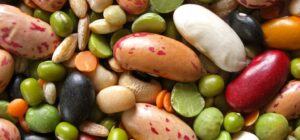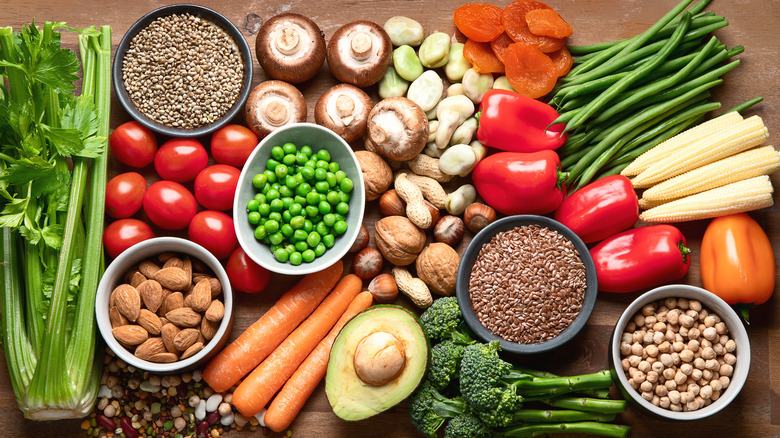If you’re looking to improve your health, you may have heard about the alkaline diet. This is a relatively new diet trend that has been gaining popularity in recent years. The goal of the alkaline diet is to maintain an optimal pH balance in the body by eating foods that are alkaline-forming. In this comprehensive guide, we will discuss everything you need to know about the alkaline diet, including its benefits, foods to eat, and tips for following it successfully.
Contents
What Is Alkaline Diet?
 The Alkaline Diet is a diet that focuses on consuming mostly alkalizing foods, such as fruits and vegetables, to achieve an optimal level of the acid-alkaline balance in the body. This type of diet has been touted as one of the best ways to improve overall health and support healthy weight management.
The Alkaline Diet is a diet that focuses on consuming mostly alkalizing foods, such as fruits and vegetables, to achieve an optimal level of the acid-alkaline balance in the body. This type of diet has been touted as one of the best ways to improve overall health and support healthy weight management.
The basis for this diet is that certain foods, like those that contain large amounts of sugar and processed foods, are acid-forming in the body. When the body is too acidic, it can lead to a number of health issues. Such as inflammation, digestive problems, fatigue, weight gain, and more.
On the Alkaline Diet, followers strive to eat 75% alkalizing foods and 25% acidifying foods. There have been recently published books and articles that provide further detail on the Alkaline diet principles. And also offer meal plans to help get started.
Therefore, if you’re looking for a way to improve your health and promote healthy weight loss, the Alkaline Diet may be something to consider. However, as with any diet, it is important to consult your doctor before making any major dietary changes.
What Foods Are In An Alkaline Diet?
If you’re following an alkaline diet, you should focus on eating foods that are low in acid and high in alkalinity. Here are the top 10 foods that you must include in your diet:
Almonds
The nuts are filled with minerals that help to balance the body’s pH levels and are used widely in alkaline diets. It is considered to be one of the best sources of essential minerals like manganese, magnesium, and phosphorus.
Leafy Greens
Vegetables like kale, spinach, arugula, and Swiss chard are considered to be alkaline-forming foods that contain plenty of nutrients including antioxidants and fiber. For example, kale is a good source of lutein, which helps protect against age-related eye diseases.
Avocados
They are naturally alkaline and filled with healthy fats that help to balance the body’s pH levels. Avocados are also packed with vitamins, minerals, and fiber to keep you full longer. A study in the Journal of Nutrition found that eating avocados can help to reduce inflammation.
Fruits
 Fruits like lemons, limes, oranges, and grapefruits are alkaline-forming fruits that contain plenty of antioxidants. They also provide vitamin C which helps support the immune system and promote healthy skin. Additionally, these fruits are low in sugar and contain fiber which helps to regulate blood sugar levels.
Fruits like lemons, limes, oranges, and grapefruits are alkaline-forming fruits that contain plenty of antioxidants. They also provide vitamin C which helps support the immune system and promote healthy skin. Additionally, these fruits are low in sugar and contain fiber which helps to regulate blood sugar levels.
Legumes
Beans, peas, and lentils are alkaline-forming legumes that are filled with vitamins, minerals, and fiber. These legumes have been linked to a lower risk of heart disease due to their high content of antioxidants and healthy fats.
Root Vegetables
Root vegetables like beets, carrots, and radishes are packed with essential minerals and vitamins. They help to balance the body’s pH levels while providing the necessary nutrition for overall health. These veggies can also help promote digestive health due to their high fiber content.
Nuts & Seeds
Nuts and seeds like flaxseeds, chia seeds, and pumpkin seeds are alkaline-forming foods that contain essential fatty acids. They help to keep the body’s pH levels balanced while providing important nutrients for overall health. These nuts and seeds can also help to reduce inflammation due to their high content of antioxidants.
Herbs & Spices
Herbs and spices like basil, oregano, turmeric, and cinnamon are great for adding flavor to your dishes while also providing health benefits. These herbs and spices are alkaline-forming foods that contain antioxidants that help to reduce inflammation in the body.
Tomatoes
Many studies have found that tomatoes are highly alkaline and contain a wide range of vitamins and minerals. Tomatoes can help to reduce inflammation due to their high content of antioxidants. Additionally, they are low in calories but packed with essential vitamins and minerals including vitamins A, K, and C.
Fats & Oils
Healthy fats like olive oil, coconut oil, and avocado oil are great for adding flavor to your dishes while also providing health benefits. These fats and oils are alkaline-forming foods that contain essential fatty acids that help to reduce inflammation in the body.
These top 10 foods should be included in an alkaline diet to ensure you’re getting all the necessary nutrients while also keeping your body’s pH levels in check. Additionally, be sure to limit or avoid foods that are acidic such as processed foods, dairy products, and sugar. By following an alkaline diet you can help support your overall health and well-being.
How Does Alkaline Diet Maintain pH Levels?
 The alkaline diet is based on the concept that food should be consumed in order to maintain an optimal pH balance of 7.35-7.45 in the body – a slightly alkaline range. This balance is believed to help protect against disease, improve digestion and promote overall health.
The alkaline diet is based on the concept that food should be consumed in order to maintain an optimal pH balance of 7.35-7.45 in the body – a slightly alkaline range. This balance is believed to help protect against disease, improve digestion and promote overall health.
The primary aim of the alkaline diet is to reduce the acid load on your body. As too much dietary and metabolic acid can cause inflammation and other health problems. To achieve this, alkaline dieters reduce their consumption of acid-forming foods like processed meats, dairy products, and refined carbohydrates. While increasing their intake of fresh fruits and vegetables.
The theory behind the diet is that, by consuming alkaline-promoting foods and avoiding acid-forming ones, the body’s pH balance can be maintained. Furthermore, it is thought that eating a diet high in fresh produce also helps to provide important vitamins and minerals which can help boost immunity and overall health.
In addition to altering your diet, there are other lifestyle changes that can help maintain a healthy pH balance. These include reducing stress and incorporating regular exercise into your daily routine. The Alkaline Diet is not based on scientific evidence. But many people find it to be an effective way to improve their health and well-being.
Is Curd Acidic or Alkaline?
Curd is acidic in nature. The pH levels of curd range from 4 to 5, which falls within the acidic range on the pH scale. Curd forms when lactic acid bacteria, including Lactobacillus bulgaricus and Streptococcus thermophilus, ferment lactose or milk sugar present in the dairy product. This process causes the release of lactic acid, which makes curd acidic in nature.
Curd is also rich in beneficial bacteria that are beneficial for our digestive health. As they help to break down food and absorb nutrients more efficiently. Moreover, the presence of probiotics in curd keeps the balance of good and bad bacteria in your gut in check. This helps to improve immunity and prevents constipation and other digestive issues.
It can also be used as a natural remedy for digestion-related problems like bloating, gas, indigestion, etc. The lactic acid present in curd helps to break down proteins and fats into smaller pieces that are easier to digest. Moreover, the probiotics in curd helps to boost the digestion process and improve overall gut health.
Overall, the curd is acidic in nature, but it also has several benefits for our digestive health and overall well-being. Thus, curd can be a great addition to your diet for good health.
What Are Some Limitations Of the Alkaline Diet?
 Generally, there are some potential limitations associated with the alkaline diet. These include:
Generally, there are some potential limitations associated with the alkaline diet. These include:
- Potential Deficiency of Essential Nutrients: Due to the emphasis on certain types of food, such as fruits and green vegetables, an alkaline diet can limit certain essential nutrients. For example, it is difficult to get adequate amounts of vitamin B12, iron, and calcium through a vegan or vegetarian diet.
- Difficulty Following: Depending on your lifestyle, an alkaline diet may be difficult to follow. For those who are used to eating large amounts of processed foods or fast food, the transition can be difficult and time-consuming.
- Potential Unpleasant Side Effects: Following a strict alkaline diet can lead to certain unpleasant side effects such as fatigue, headaches, and muscle cramps. These are usually temporary, however, and can be avoided by listening to your body and adjusting the diet accordingly.
- Potential Health Risks: Despite claims of improved health, there is no scientific evidence that an alkaline diet will truly improve health or reduce the risk of disease. In fact, some experts suggest that an alkaline diet may even be harmful to certain individuals. It is important to speak with your doctor before making any significant dietary changes.
Overall, the alkaline diet can provide health benefits and should be considered for those looking for a healthier lifestyle. However, it is important to understand potential limitations and work with your doctor or dietician to make sure your body is receiving the nutrients it needs.
Conclusion
To conclude, the alkaline diet is a wonderful way to supplement your existing diet and lifestyle and can be a great way of achieving optimal health. While the evidence for its effectiveness is still limited, there is definitely potential in following an alkaline diet to help reduce inflammation and prevent certain diseases.
Be sure to consult with a health professional before starting any new diet plan. And always make sure to get plenty of rest, exercise, and healthy fruits and vegetables. Lastly, don’t forget to take the time to enjoy some alkaline-rich foods in your regular diet for optimal health benefits!
If you’re interested in learning more, seek the expertise of FitMantra! Our experienced nutritionists can be easily accessed with just a few clicks. And will offer personalized support to assist you in achieving your fitness goals. Our online nutrition counseling, and weight loss program has been designed to help you shed those unwanted pounds! Don’t forget to download our Fitness App available on Android.
